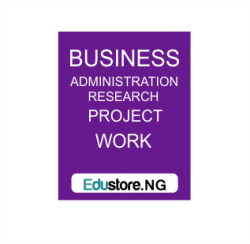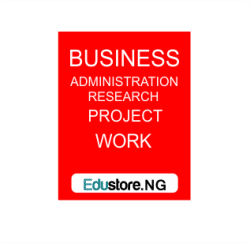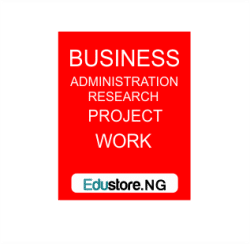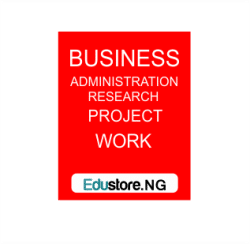ABSTRACT
Lack of potable water has always been a problem for many communities, especially in de-veloping countries, and Ilaje in Nigeria, is not an exception to this lack of healthy water. The aim of this study was focused on current water situation in Ilaje, hence investigating the market potential for purified potable water in the region. There are different reports from the United Nations and more organizations about future shortage of water. Among the world strategic resources, oil, land, coal etc., none of them will be more valuable than fresh water in the coming decades.
The oil rich Ilaje region has a population of approximately three hundred thousand (300,000) inhabitants; this alone is staggering enough to convince potential investors in water technology industry. However, there was a need to look into the possibility of ventur-ing into such a business there, through some research methods that will get the opinion of the prospective consumers and the view of the policy makers towards a private purified water company in the region. This resulted in a structured questionnaire to carry out a sur-vey; some interviews were also executed to support the available secondary information.
Despite being surrounded with water, it was found that drinking waters are supplied to Ilaje communities from neighbouring towns through motor trucks; the closest town is about 25km away from Ilaje, and the purity of the water is not guaranteed. Based on all the information gathered, Ilaje remains a potential market for healthy potable water, but still lacks basic infrastructures for direct water supply to homes through pipes.
INTRODUCTION 1.1 Background
Oil was discovered in the Niger Delta area of Nigeria towards the late 1950’s (Mbendi 2010) and the Ilaje communities are parts of this oil rich region. Due to the continuous spills of crude oil (Waado 2010) from the oil mining rings; the entire ecosystem in these communi-ties has been decaying for decades. Healthy seafood’s and fresh agricultural produce are becoming scarce including clean drinking water. The UN says that at any time half the hos-pital beds in the developing world are occupied by patients suffering from diarrhea and other water related ailments (UNDP, 2004).
Ilaje local government consists of over four hundred towns and villages, covering an area of 3,000 square kilometers. It southern boundary is by the Atlantic Ocean, and the extreme south is covered by silt, and mud and superficial sedimentary deposit. The Ilajes are a dis-tinguished, distinct linguistic of the Yoruba stalk, the Ilajes occupies the coastline in Ondo State, South-West, Nigeria. Ilaje as a whole is endowed with vast oil and gas reserves, there are oil wells and fields spread all over the Local Government Area both offshore and on-shore, Oil Companies such as Shell, Chevron, Texaco Nigeria Ltd and Consolidated Oil, Ex-press Petroleum and Gas Company, Atlas Oil Company, Allied Energy Oil Company, Caven-dish oil Company, Exxon-Mobil were at a time already operation in the Local Government Area thereby leading to the constant pollution of the riverine communities and their entire ecosystem, despite its 180km shoreline which makes Ondo State the state with the longest shoreline in Nigeria; Ilaje region still lacks potable drinking water.(Coastline news, 2010). Many locals fetch water from stream, pond, river, sea and traditional wells which are gen-erally considered unhealthy for drinking. Currently, development of surface and under-ground water has become a problem due to the presence of abundant salty seawater in Ilaje region (Yahaya et al., 2009).
There are local water dealers with boreholes operating from nearby towns the nearest is about 25km; they supply drinking water to Ilaje via motor trucks which leads to the possibil-ity of being contaminated before delivery, hence it will be baseless to spend substantial amount of money on promotion and advertising to lure competitors customers in such a case. Considering the potential for contamination in the water supply, whether supplied by water dealers or taken from other sources, there is potentially a great demand for an alter-native source of clean drinking water, which can be exploited if one has already done the research homework to determine the “products and services to address the current needs of the customers” (Kaden., 2006, p.41). This thesis will focus more on the importance of a purified water company situated in Ilaje and the available market potential for such a com-pany.
1.2 Research objectives
The objective of this thesis aims to identify the potential market in the Ilaje region for clean healthy drinking water. Access to purified water in Ilaje is becoming scarce and ex-pensive; the situation is not sparing anyone, including the rich and the poor. Water is essen-tial to the survival of all living things and the need for quality water is constantly increas-ing.
According to the 2006 National Population Census in Nigeria, the Local Government was considered as one of the most populated in Ondo State, with a growing population figure of 289,838, (NPC, 2006). Such a growing population will definitely increase the use of water.
1.3 Research Questions
The general research question of this study is what is the potential market for clean healthy drinking water in Ilaje? This thesis will attempt to answer this broader questionthrough the following sub-questions:
What are the economic and social factors affecting the lack of potable drinking wa-ter in Ilaje?
What are the technical and environmental problems investors in water purification are likely to face in starting up a mini water corporation in the region?
Is there a need and market for healthy drinking water in Ilaje?
DISCLAIMER:
- For Reference Only: Materials are for research, citation, and idea generation purposes and not for submission as your original final year project work.
- Avoid Plagiarism: Do not copy or submit this content as your own project. Doing so may result in academic consequences.
- Use as a Framework: This complete project research material should guide the development of your own final year project work.
- Academic Access: This platform is designed to reduce the stress of visiting school libraries by providing easy access to research materials.
- Institutional Support: Tertiary institutions encourage the review of previous academic works such as journals and theses.
- Open Education: The site is maintained through paid subscriptions to continue offering open access educational resources.






